一般将来时被动语态
(完整版)一般将来时的被动语态
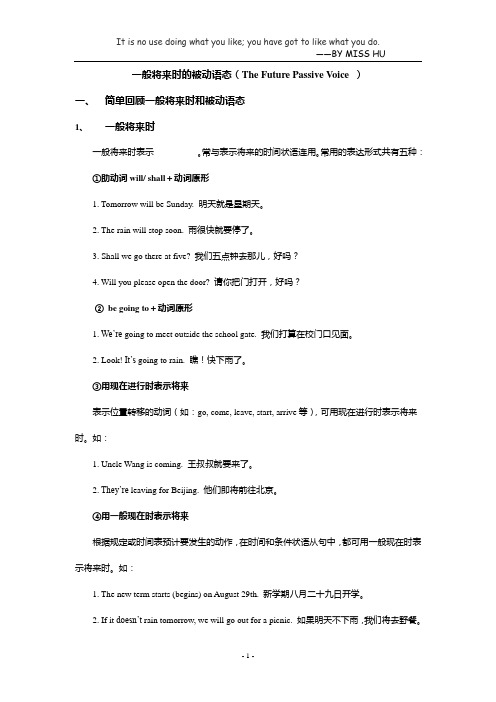
一般将来时的被动语态(The Future Passive Voice )一、简单回顾一般将来时和被动语态1、一般将来时一般将来时表示__________。
常与表示将来的时间状语连用。
常用的表达形式共有五种:①助动词will/ shall+动词原形1. Tomorrow will be Sunday. 明天就是星期天。
2. The rain will stop soon. 雨很快就要停了。
3. Shall we go there at five? 我们五点钟去那儿,好吗?4. Will you please open the door? 请你把门打开,好吗?②be going to+动词原形1. We’re going to meet outside the school gate. 我们打算在校门口见面。
2. Look! It’s going to rain. 瞧!快下雨了。
③用现在进行时表示将来表示位置转移的动词(如:go, come, leave, start, arrive等),可用现在进行时表示将来时。
如:1. Uncle Wang is coming. 王叔叔就要来了。
2. They’re leaving for Beijing. 他们即将前往北京。
④用一般现在时表示将来根据规定或时间表预计要发生的动作,在时间和条件状语从句中,都可用一般现在时表示将来时。
如:1. The new term starts (begins) on August 29th. 新学期八月二十九日开学。
2. If it doesn’t rain tomorrow, we will go out for a picnic. 如果明天不下雨,我们将去野餐。
⑤“be+动词不定式”或“be about to +动词原形”1. He is to visit Japan next year. 明年他将访问日本。
2. They’re about to leave. 他们就要走了。
一般将来时的被动语态例句

一般将来时的被动语态例句一般将来时的被动语态例句:一般将来时的被动语态构成:will+ be + 及物动词的过去分词:A new hospital will be built in our city.Many more trees will be planted next year.The classroom will be cleaned by Lilei tomorrow.These homework will be finished in ten minutes.The building will be built in the end of this year.I think he will be beat in the end.Thousands of trees be planted on the hill next year.They will be asked to attend the meeting.In class you will not be allowed to leave .This letter will not be posted tomorrow.These cups be broken by he yesterday.A horse will not be drawn in a second.I think i will be killed by you.This song will be sung tomorrow .The tenth lesson will be learnt in next week .Lunch is going to be finished cooking when i come backHe will be sent to America to study when you come back .问:一般将来时的被动语态可用于哪些场合?答:如果一个动作在将来某个时间发生或持续,且句子的主语又是该动作的承受者,那就要用一般将来时的被动语态.一般将来时中常有tomorrow,next year,in two hours,after three o’clock等时间状语.如:This building will be finished next year.这幢楼将于明年完工.A new factory is going to be built in our city.一个新工厂将在我市建成.My homework is to be finished in ten minutes.我的家庭作业将在10分钟内完成.问:一般将来时的被动语态有哪些主要表达形式?答:主要表达形式有四种:a.will/shall+ be done 如:The new film will be shown next Thursday.这部新电影将在下周四上映.b.be going to +be done (表示即将发生的被动行为)如:The sports meeting is going to be held on April 10.运动会将于四月十日举行.c.be to +be done (表示按计划进行或征求对方意见)如:The problem is to be discussed at the meeting tomorrow.这个问题将在明天的会上讨论.d.be about to be done (表示某事即将发生,后不接时间状语)如:An answer is about to be given to you.马上给你答复.3.问:一般现在时被动语态能否代替一般将来时被动语态?答:能.但这种替代是有条件的.在时间、条件状语从句中,也用一般现在时的被动语态代替一般将来时的被动语态.如:If I am given enough time,I will go to Japan for my holiday.如果我有足够的时间,我要去日本度假.。
一般将来时的被动语态
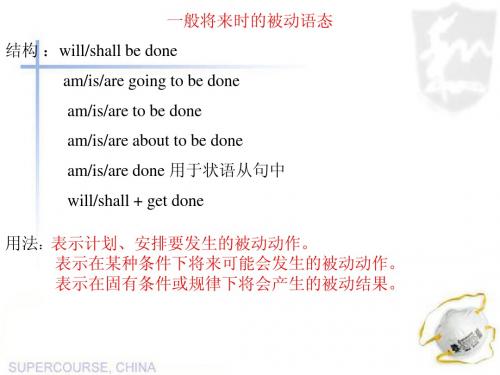
习题演练 A 1. Don’t worry ; all the flowers in the garden ________good care of when you are away. A. will be taken B. have taken C. have been taken D. will take B 2. The volleyball match _______ if it rains tomorrow. A. Will put off B. will be put off C. is put off D. puts off 3. ------Do you have any problems if you _____ C this job? ------Well, I’m thinking about the salary. A. offer B. will offer C. are offered D. will be offered D 4. In the near future, more advances in the robot technology _____ by science. A. are making B. are made C. will make D. will be made A 5. The weather will continue when a cold front ______ to arrive. A. is expected B. is expecting C. was expected D. withe weather is so bad, the sports meeting _________. A. is to put off B. is put off C. is to be put off D. will put off
一般将来时的被动语态

注意的几个问题
1.在时间,条件状语从句中,应使用现在时表将来,同样,应使用现在时的被 动语态表示将来时的被动语态。 eg:He says he will leave the company if he is punished for this. 短语动词便被动语态时不能漏掉介词和副词。 那个老年人将会照顾好这个小女孩。 —————————————————— The little girl will be taken care of by the old man.
一般将来时的被动语态
否定式: won`t/shan`t be 动词id过去分词
疑问式:
will/shall 主语 be 过去分词 特殊疑问句: 特殊疑问词 shall/will 主语 be 过去分词 其他 1.他将不会受到惩罚 eg:He will not be punished for it. 下个月这所房子将重刷吗? eg: Will the house be painted again next month? 将在哪里建电影院? eg: Where will the cinema be built.
一般将来时的被动语态
一般将来时的几种表达法
主动形式
1. will/shall do
被动结构
will/shall be done
2 .be
3.be
to do
be to be done
be going to be done be about to be done
going to do
4. be about to do
A.把下列句子改成被动结构
1.Sue is going to write the report. The report is going to be written by Sue. ____________________________________________.
英语各时态的主动句和被动句

一般将来时(Simple Future):主动语态:明天我将会见我的朋友。
(I will meet my friend tomorrow.)被动语态:我的朋友将被我明天见到。
(My friend will be met by me tomorrow.)主动语态:下个月我将搬到一个新的城市。
(I will move to a new city next month.)被动语态:一个新的城市将被我下个月搬到。
(A new city will be moved to by me next month.)主动语态:明年我将开始学习弹钢琴。
(I will start learning to play the piano next year.)被动语态:学习弹钢琴将被我明年开始。
(Learning to play the piano will be started by me next year.)现在进行时(Present Continuous):主动语态:我正在看电视节目。
(I am watching a TV show.)被动语态:电视节目正在被我观看。
(A TV show is being watched by me.)主动语态:他们正在制定新的计划。
(They are making new plans.)被动语态:新的计划正在被他们制定。
(New plans are being made by them.)主动语态:我们正在等待朋友的到来。
(We are waiting for our friend's arrival.)被动语态:朋友的到来正在被我们等待。
(Our friend's arrival is being waited for by us.)现在完成时(Present Perfect):主动语态:我已经完成了我的工作报告。
(I have finished my work report.)被动语态:我的工作报告已经被我完成了。
一般将来时被动语态(共7张PPT)

被动语态(The Passive Voice):
主动语态表示主语是动作的执行者;
被动语态表示主语是动作的承受者。
结构为:be(am,is,are,was,were )+done
一般将来时:主语+will/shall+动原
被动语态:主语+will/shall + be+过去分词
被动语态否定:主语+will/shall +not+ be+过去分词
7.produce produced produced
8、ask asked asked 9、plan planned planned 10、send sent sent 11 、 build built built 12、invite invited invited
一般将来时:主语+will + be+过去分词 The new school ______ when the new term begins. A. finishes B. will finish C. will be finished D. would finish
不规则的过去分词要牢记
sing----sang----sung
build----built----built
写出下列动词的过去式,过去分词:
( 1、speak
)
( 2、use
)
3、make (
)
4、write (
)
5、grow (
)
( 6、plant
)
( 7、produce
)
( 8、ask
)
9、plan (
)
一般将来时的被动语态

The work will be finished (by them)
in ten days.
一般将来时: S+ will+be+过去分词
They will complete the hospital next month.
The hospital will be completed (by them) next month.
• 注意:如果把直接宾语改为主语,则在间 接宾语前加to或for。
• 主动:My mother will give me a Tshirt. • 被动:A T-shirt will be given to me ( by my mother). • 主动:My mother will buy me a new coat. • 被动:A new coat will be bought for me ( by my mother ).
be told …
表示一般将来时的被动语态的 其他结构:
a. be going to + be + done
e.g. 主动:We are going to put off the meeting. 被动:The meeting is going to be put off.
b. be to + be + done
e.g. 主动:We are to repair the machine tomorrow. 被动:The machine is to be repaired ( by us ) tomorrow.
2.主语 + 谓语 + 间接宾语 + 直接宾语
(含有双宾语的主动语态,在变为被动语态 时,可将其中一个宾语改为主语,另一个 不变。习惯上把间接宾语改为被动语态的 主语。)
一般将来时被动语态的基本结构

一般将来时被动语态的基本结构
1. 一般将来时被动语态的基本结构就是“will be + 过去分词”呀!就像“这棵树明天将会被砍倒”。
2. 你想想看,“will be + 过去分词”,多简单直接呀!比如说“那座房子将来会被重建”。
3. 不就是“will be + 过去分词”嘛,很好理解的啦!像“这个计划下个月会被实施”。
4. 哎呀,一般将来时被动语态基本结构就是这样啦,“will be + 过去分词”,就好比“那辆车很快会被修好”。
5. 一般将来时被动语态,不就是“will be + 过去分词”嘛,多明显呀!比如“这个问题将来会被解决”。
6. 嘿,就是“will be + 过去分词”呀,很容易记住的哟!像“这些花明天会被浇水”。
7. 一般将来时被动语态的基本结构不就是“will be + 过去分词”嘛,就跟“那个包裹很快会被送达”一样。
8. 你看呀,“will be + 过去分词”,不难理解吧!例如“这件衣服将来会被洗干净”。
9. 这不就是“will be + 过去分词”嘛,简单得很呢!像“那片区域以后会被开发”。
10. 一般将来时被动语态的基本结构呀,就是“will be + 过去分词”,就好像“这些水果明天会被吃掉”。
我的观点结论:一般将来时被动语态的基本结构就是“will be + 过去分词”,掌握了这个,很多表达就容易多啦!。
九年义务初中英语一般将来时的被动语态知识点归纳总结
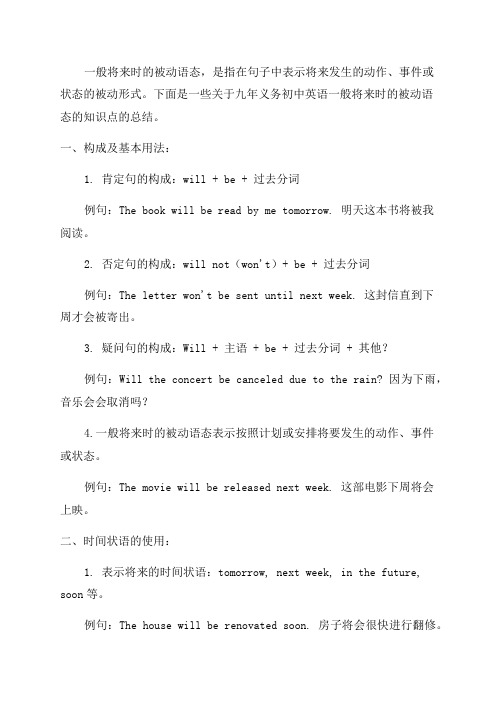
一般将来时的被动语态,是指在句子中表示将来发生的动作、事件或状态的被动形式。
下面是一些关于九年义务初中英语一般将来时的被动语态的知识点的总结。
一、构成及基本用法:1. 肯定句的构成:will + be + 过去分词例句:The book will be read by me tomorrow. 明天这本书将被我阅读。
2. 否定句的构成:will not(won't)+ be + 过去分词例句:The letter won't be sent until next week. 这封信直到下周才会被寄出。
3. 疑问句的构成:Will + 主语 + be + 过去分词 + 其他?例句:Will the concert be canceled due to the rain? 因为下雨,音乐会会取消吗?4.一般将来时的被动语态表示按照计划或安排将要发生的动作、事件或状态。
例句:The movie will be released next week. 这部电影下周将会上映。
二、时间状语的使用:1. 表示将来的时间状语:tomorrow, next week, in the future, soon等。
例句:The house will be renovated soon. 房子将会很快进行翻修。
2. 表示将来的频率状语:always, often, constantly等。
例句:The room will always be cleaned by the maid. 房间将会一直由女佣打扫。
三、其它用法:1.一般将来时的被动语态也可用于陈述事实、普遍真理等情况。
例句:English will be spoken by people all over the world. 英语将会被全世界人民所说。
2.当句子的主语是物,而非人时,将来时的被动语态只能用于一般将来时。
3.一般将来时的被动语态可以与表示将来的时间连词连用,以表明将来的动作发生在一些具体的时间点。
(完整版)一般将来时的被动语态
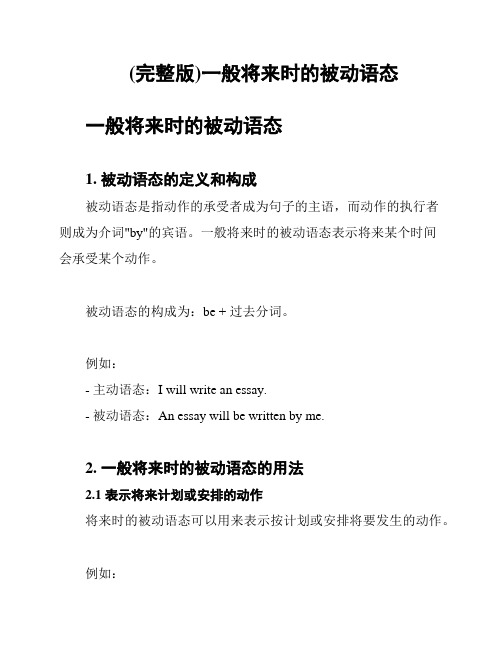
(完整版)一般将来时的被动语态一般将来时的被动语态1. 被动语态的定义和构成被动语态是指动作的承受者成为句子的主语,而动作的执行者则成为介词"by"的宾语。
一般将来时的被动语态表示将来某个时间会承受某个动作。
被动语态的构成为:be + 过去分词。
例如:- 主动语态:I will write an essay.- 被动语态:An essay will be written by me.2. 一般将来时的被动语态的用法2.1 表示将来计划或安排的动作将来时的被动语态可以用来表示按计划或安排将要发生的动作。
例如:- 主动语态:They will hold a ___.- 被动语态:A meeting will be ___.2.2 表示主动语态中的一般将来时的被动语态当主动语态中的谓语动词为一般将来时时,可以转换为一般将来时的被动语态。
例如:- 主动语态:___.- 被动语态:The work will be ___.2.3 阐述将来的预测或推测一般将来时的被动语态也可以用来表达对将来的预测或推测。
例如:- 主动语态:They ___.- 被动语态:A ___.3. 注意事项3.1 动作执行者未知或无关紧要时当我们对动作执行者不感兴趣或无法确定时,可以使用被动语态。
例如:- 主动语态:___ will fix the car.- 被动语态:The car will be fixed.3.2 动作执行者已知但无需强调时当我们知道动作执行者是谁,但无需强调时,可以使用被动语态。
例如:- 主动语态:John will cook the dinner.- 被动语态:The dinner ___.4. 总结一般将来时的被动语态用于表示将来某个时间会承受动作的情况。
它的构成为be + 过去分词,并在一些特定场景下有特殊用法。
在使用一般将来时的被动语态时,需要注意动作执行者未知或无关紧要的情况和动作执行者已知但无需强调的情况。
一般将来时被动语态
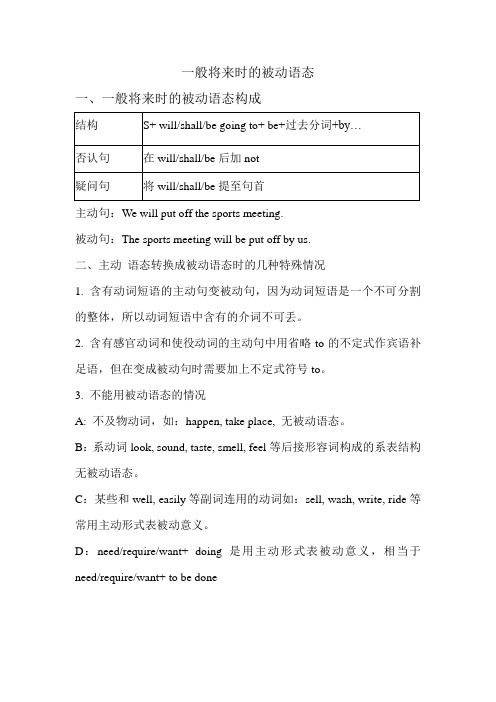
一般将来时的被动语态
一、一般将来时的被动语态构成
主动句:We will put off the sports meeting.
被动句:The sports meeting will be put off by us.
二、主动语态转换成被动语态时的几种特殊情况
1. 含有动词短语的主动句变被动句,因为动词短语是一个不可分割的整体,所以动词短语中含有的介词不可丢。
2. 含有感官动词和使役动词的主动句中用省略to的不定式作宾语补足语,但在变成被动句时需要加上不定式符号to。
3. 不能用被动语态的情况
A: 不及物动词,如:happen, take place, 无被动语态。
B:系动词look, sound, taste, smell, feel等后接形容词构成的系表结构无被动语态。
C:某些和well, easily等副词连用的动词如:sell, wash, write, ride等常用主动形式表被动意义。
D:need/require/want+ doing是用主动形式表被动意义,相当于need/require/want+ to be done。
一般将来时的被动语态

3
b件事。
一般将来时的被动语态的例句
医生会在下周给你打电话。 这本书将会被翻译成多种语言。
The doctor will call you next week.
This book will be translated into many languages.
一般将来时的被动语态的否定句
1 构成
will + not + be + 过去分词
否定句
will + not + be + 过去分词
疑问句
Will + 主语 + be + 过去分词?
一般将来时的被动语态的用法
强调动作
将被强调的动作置于句首。
存在将来时的上下文
如果情境中需要表示将来时的 动作被动发生,可以使用一般 将来时的被动语态。
解释规则要求
某些语言的规则要求使用被动 语态来表达将来的事件。
2 例子
这个计划不会被取消。 这个工作不会被完成。
一般将来时的被动语态的疑问句
1 构成
Will + 主语 + be + 过去分词?
2 例子
你明天会被请出席会议吗? 将会有人参加聚会。
一般将来时的被动语态的特殊句型
1
by + 时间
到某个具体的时间,指定特定的事件必须完成。
2
within + 时间
表示将在一定时间范围内完成某件事。
一般将来时的被动语态
在本次演示中,我们将介绍一般将来时的被动语态的定义、构成、用法、例 句、否定句、疑问句和特殊句型。
什么是一般将来时的被动语态?
定义
表示将来某个时间会被动地发生的动作或状态。
unit2一般将来时的被动语态

疑问句型转换
疑问句型转换
Will+主语+be+动词的过去分词+by引导的时间状语?
例如
Will the new album be released this year? 这张新专辑会在今年发行吗?
解释
在疑问句中,一般将来时的被动语态使用“Will+主语+be+动词的过去分词”的形式, 表示询问某个动作是否将在未来某个时间点发生,并且该动作是被动语态。
"be done"
表示将来某个时间点或时间段内,某事将会被完成或发生。
"will have been done"
表示在将来的某个时间点之前,某事已经被完成或发生。
02
一般将来时被动语态的用 法
表示未来的动作
01
02
03
句子结构
主语+will be+动词的过 去分词+其他成分
示例
The new library will be opened next year. (新图 书馆将在明年开放。)
04
一般将来时被动语态的注 意事项
时态一致性
确保句子时态前后一 致,特别是与主句时 态的配合。
在描述一系列动作时, 应保持时态一致性, 以使句子更加流畅。
避免在同一个句子中 出现ຫໍສະໝຸດ 同时态的被动 语态,以免造成混淆。
主被动关系
明确主语与谓词之间的关系, 确保正确使用被动语态。
注意区分施事与受事,避免将 被动语态误用为主动语态。
肯定句型转换
01
肯定句型转换
主语+will be+动词的过去分词+by引导的时间状语。
动词的一般将来时被动语态
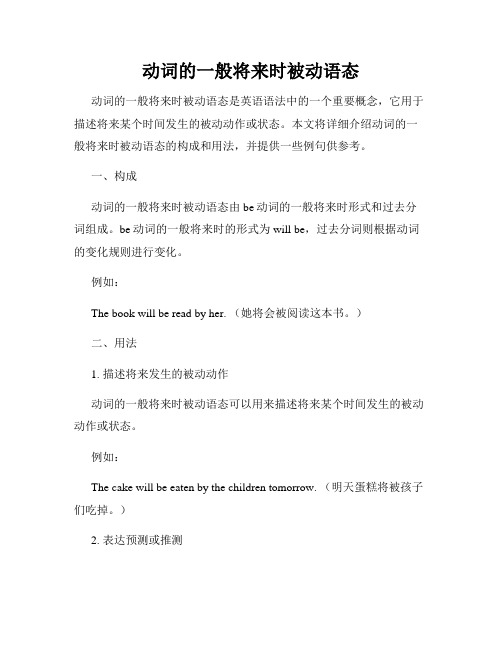
动词的一般将来时被动语态动词的一般将来时被动语态是英语语法中的一个重要概念,它用于描述将来某个时间发生的被动动作或状态。
本文将详细介绍动词的一般将来时被动语态的构成和用法,并提供一些例句供参考。
一、构成动词的一般将来时被动语态由be动词的一般将来时形式和过去分词组成。
be动词的一般将来时的形式为will be,过去分词则根据动词的变化规则进行变化。
例如:The book will be read by her. (她将会被阅读这本书。
)二、用法1. 描述将来发生的被动动作动词的一般将来时被动语态可以用来描述将来某个时间发生的被动动作或状态。
例如:The cake will be eaten by the children tomorrow. (明天蛋糕将被孩子们吃掉。
)2. 表达预测或推测动词的一般将来时被动语态还可以用来表达对将来事件的预测或推测。
例如:The concert will be attended by a large audience. (这场音乐会将会有很多观众参加。
)3. 提议或打算在某些情况下,动词的一般将来时被动语态可以用来表示提议或打算。
例如:The meeting will be held in the conference room. (会议将在会议室举行。
)三、例句1. The letter will be sent by John later. (信将会后来由约翰寄出。
)2. The house will be painted by a professional painter next week. (房子将由一名专业的画家在下周粉刷。
)3. The package will be delivered to your address tomorrow. (包裹将在明天送到你的地址。
)4. The project will be completed by the end of this year. (这个项目将在今年年底完成。
一般将来时的被动语态
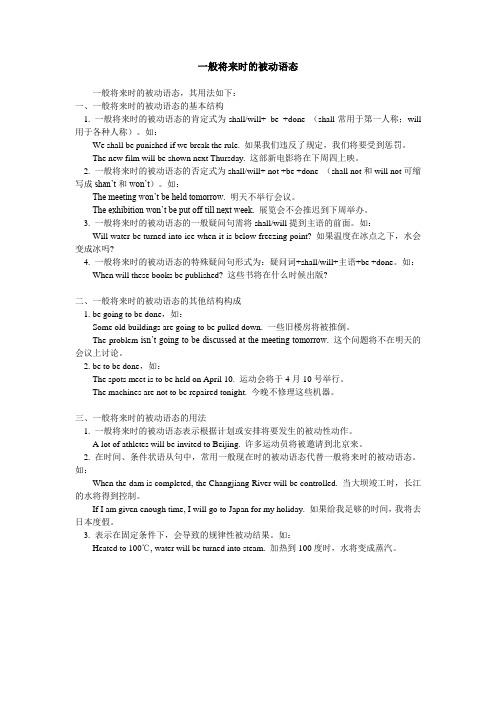
一般将来时的被动语态一般将来时的被动语态,其用法如下:一、一般将来时的被动语态的基本结构1. 一般将来时的被动语态的肯定式为shall/will+ be +done (shall常用于第一人称;will 用于各种人称)。
如:We shall be punished if we break the rule. 如果我们违反了规定,我们将要受到惩罚。
The new film will be shown next Thursday. 这部新电影将在下周四上映。
2. 一般将来时的被动语态的否定式为shall/will+ not +be +done (shall not和will not可缩写成shan’t和won’t)。
如:The meeting won’t be held tomorrow. 明天不举行会议。
The exhibition won’t be put off till next week. 展览会不会推迟到下周举办。
3. 一般将来时的被动语态的一般疑问句需将shall/will提到主语的前面。
如:Will water be turned into ice when it is below freezing point? 如果温度在冰点之下,水会变成冰吗?4. 一般将来时的被动语态的特殊疑问句形式为:疑问词+shall/will+主语+be +done。
如:When will these books be published? 这些书将在什么时候出版?二、一般将来时的被动语态的其他结构构成1. be going to be done,如:Some old buildings are going to be pulled down. 一些旧楼房将被推倒。
The problem isn’t going to be discussed at the meeting tomorrow. 这个问题将不在明天的会议上讨论。
完整版一般将来时的被动语态

一般将来时的被动语态(The Future Passive Voice )一、简单回顾一般将来时和被动语态1、一般将来时一般将来时表示 __________ 。
常与表示将来的时间状语连用。
常用的表达形式共有五种:①助动词will/ shall +动词原形1. Tomorrow will be Sun day. 明天就是星期天。
2. The rain will stop soo n.雨很快就要停了。
3. Shall we go there at five?我们五点钟去那儿,好吗?4. Will you please open the door? 请你把门打开,好吗?②be going to +动词原形1. We' rgoing to meet outside the school gate.我们打算在校门口见面。
2. Look! It 'going to rain.瞧!快下雨了。
③用现在进行时表示将来表示位置转移的动词(如:go, come, leave, start, arrive等),可用现在进行时表示将来时。
如:1. U ncle Wang is comi ng.王叔叔就要来了。
2. They ' leaving for Beijing. 他们即将前往北京。
④用一般现在时表示将来根据规定或时间表预计要发生的动作,在时间和条件状语从句中,都可用一般现在时表示将来时。
如:1. The new term starts (begins) on August 29th.新学期八月二十九日开学。
2. If it doesn rain tomorrow, we will go out for a picnic. 如果明天不下雨,我们将去野餐。
⑤“动词不定式"或“ be about to +动词原形”1. He is to visit Jap an next year.明年他将访问日本。
一般将来时的被动语态

to
4.We are to put off the meeting till Friday.
The meeting is to be put till Friday. off n5e.eIdn+eeddotiongre=panieretdhteohboeudseo.ne.
The house needs repairing.
2. They will put another three subways into use in this city. Another three subways _w_i_ll_b_e__p_u_t_i_n_to__u_se in this city.
3. We are to put off the sports meeting because of the bad weather. The sports meeting __is__to__b_e_p_u_t__o_ff___ because of the bad weather. 4. They will not allow you to take so
A new bridge was built last year.
4.He can carry the basket easily.
The basket can be easily carried .
presentation
1. The 2008 Olympic Games will be held in Beijing, China.
Grammar
The Future Passive Voice
一般将来时的被动语态
Revision
被动语态结构:be动词+及物动词的过去分词
一般将来时的被动语态

一般将来时的被动语态1. 什么是一般将来时的被动语态一般将来时的被动语态是指在将来发生的动作或状态下,主语承受动作或承受状态。
被动语态的结构为:will be + 过去分词。
2. 一般将来时的被动语态的构成一般将来时的被动语态的构成如下:- 肯定句:主语 + will be + 过去分词- 否定句:主语 + will not be + 过去分词- 疑问句:Will + 主语 + be + 过去分词 + ?3. 一般将来时的被动语态的使用情况一般将来时的被动语态通常用于以下情况:- 描述将来的预测、计划或安排- The meeting will be held next week. (会议将于下周举行。
)- The house will be renovated next month. (房子将在下个月进行翻修。
)- 描述某人对将来事件的预测或判断- The movie will be loved by audiences. (这部电影将会受到观众的喜爱。
)- The new product will be well received in the market. (这个新产品将在市场上受到好评。
)- 描述按计划或安排将要发生的动作或事件- The report will be submitted before the deadline. (报告将会在截止日期之前提交。
)- The package will be delivered to your address tomorrow. (包裹将于明天送到您的地址。
)4. 小结一般将来时的被动语态是在将来发生的动作或状态下,主语承受动作或承受状态的语态形式。
它的构成为:will be + 过去分词。
一般将来时的被动语态通常用于描述将来的预测、计划或安排,某人对将来事件的预测或判断,以及按计划或安排将要发生的动作或事件。
- 1、下载文档前请自行甄别文档内容的完整性,平台不提供额外的编辑、内容补充、找答案等附加服务。
- 2、"仅部分预览"的文档,不可在线预览部分如存在完整性等问题,可反馈申请退款(可完整预览的文档不适用该条件!)。
- 3、如文档侵犯您的权益,请联系客服反馈,我们会尽快为您处理(人工客服工作时间:9:00-18:30)。
一般将来时被动语态语态是表示主语和动词之间的主动关系或被动关系的动词形式。
英语动词有两种语态:主动语态和被动语态。
主动语态表示主语是动作的执行者(施动者),被动语态表示主语是动作的承受者(受动者)。
本单元的语法是一般将来时态的被动语态,现就其用法归纳如下:一、一般将来时态的被动语态的基本结构的构成:1.一般将来时态的被动语态的肯定式为:shall / will + be + done。
(shall 用于第一人称;will用于各种人称) 如:We shall be punished if we break the rule.如果我们违反规定,我们将要受到惩罚。
The new film will be shown next Thursday.这部新电影将在下周四上映。
2.一般将来时态的被动语态的否定式为:shall / will + not + be + done.(可缩写成shan’t或won’t)如:The meeting won’t be held tomorrow.明天不再举行会议。
The exhibition won’t be put off till next wee k.展览会将不会推迟到下周。
3.一般将来时态的被动语态的一般疑问句需将shall / will提到主语的前面。
(回答用yes或no)如:Won’t water be turned into ice, it it is belwo freezing?如果气温在冰点之下,水难道不会变成冰吗?---Will the work be finished at once? ---Yes, it will.---这项工作会立刻被完成吗?---是的,立刻就完成。
4.一般将来时态的被动语态的特殊疑问句为:疑问词+ shall / will + S + be + done。
如:When will these books be published?这些书将在什么时候被出版?Whom will this book be written by?谁来写这本书?二、一般将来时态的被动语态的其他结构构成:1.be going to be doneSome old buildings are going to be put down. 一些旧的楼房将被推倒。
The problem isn’t go ing to be discussed at the meeting tomorrow.这个问题将不在明天的会议上被讨论。
---Are these trees going to be cut down?---Yes,they are.---这些树将被砍倒吗?---是的,将被砍倒2.be to be doneThe sports meet is to be held on April 10.运动会将于四月十日举行。
The machines are not to be repaired tonight.今晚将不会修理这些机器。
---Are new textbooks to be published next week?---No, they aren’t.新教科书将在下周出版吗?不,不是。
三、一般将来时态的被动语态的用法:1.一般将来时态的被动语态的同它的主动语态一样,强调表示根据计划或安排将要发生的被动性动作。
The new film will be shown next Thursday.这部新电影将在下周四上映。
A lot of athletes will be invited to Beijing.好多运动员将被邀请到北京来。
2.在时间、条件状语从句中,常用一般现在时的被动语态代替一般将来时的被动语态。
如:When the dam is completed, the Changjiang River will be controlled.当大坝竣工时,长江将得到控制。
If I am given enough time, I will go to Japan for my holiday.如果我有足够的时间,我将去日本度假。
3.表示有固定性条件就有规律性被动结果。
如:Heated to 100·c , water will be turned into steam.加热到100度时,水将会变成蒸气。
If you speak in class, you will be punished.如果你在课堂上讲话,你将会被惩罚。
练习题I. 单选:1. These films ______ until tomorrow morning.A. can't developB. aren't developingC. won't be developedD. won't develop2. Hundreds of jobs ______ if the factory closes.A. loseB. will be lostC. are lostD. will lose3. —A party is going to ______ tonight. Would you like to go with me?—I’d like to, but I have to look a fter my sick mother.A. organizeB. have been organizedC. be organizingD. be organized4. The water will be further polluted unless some measures ______.A. will be takenB. are takenC. were takenD. had been taken5. If it doesn’t rain tomorrow, the sports meet ______ in the playground of our school.A. is holdingB. will holdC. will be heldD. is to be holding6. The problem ______ in the coming meeting.A. is discussedB. is discussingC. is being discussedD. will be discussed7. The mistakes in the exercises will ______ the teacher.A.crossB.be crossingC.be crossed byD.cross by8. If city noises ______ from increasing,people ______ shout to be heard even at dinner.A.are not kept;will have toB.are not kept;haveC.do not keep;will have toD.do not keep;have to9. The sports meeting ______ .A.is put offB.is to put offC.is to be put offD.puts off10. I need one more stamp before my collection ______.A.has completedpletesC.has been completedD.is completed11. The work ______ soon.A. will be finishedB. has been finishedC. will finishD. finishes12. I ______ if I finish the work within one day.A. shall be praisedB. would praiseC. will praiseD. praiseII. 主动句变被动句:1. We shall discuss the question at the next meeting.2. I shall give you the book tomorrow.3. The chairman will ask us to attend the meeting.4. He will soon decide when we shall have the meeting.5. If the weather permits, we will complete the works on time.6. If you give me more time, I’ll work out the problem.答案:I. 单选:1-5 C B D B C 6- 10 D C A C D 11-12 A AII. 主动句变被动句:1. The question will be discussed at the next meeting.2. You will be given the book tomorrow. / The book will be given to you tomorrow.3. We shall be asked to attend the meeing (by the chairman).4. When we shall have the meeting will soon be decided.5. If the weather permits, the works will be completed on time.6. If more time is given to me, the problem will be worked out.。
